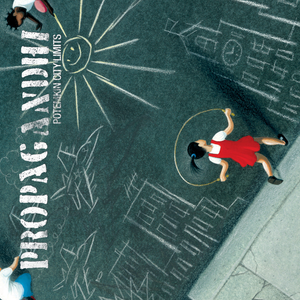Current members:
Chris Hannah – vocals, guitar (1986–present)
Jord Samolesky – drums (1986–present)
Todd Kowalski – bass, vocals (1997–present)
Sulynn Hago – guitar, vocals (2015–present)
Former members
Scott Hopper – bass, vocals (1986–89)
Mike Braumeister – bass (1989–91)
John K. Samson – bass, vocals (1991–97)
David Guillas – guitar, vocals (2006–2015)
1993 - How to Clean Everything
1996 - Less Talk, More Rock
2001 - Today's Empires, Tomorrow's Ashes
2005 - Potemkin City Limits
2009 - Supporting Caste
2012 - Failed States
2017 - Victory Lap
Fixed Frequencies
Propagandhi Lyrics
Jump to: Overall Meaning ↴ Line by Line Meaning ↴
The lyrics of Propagandhi's song "Fixed Frequencies" can be interpreted as a criticism of Western imperialism and colonialism, particularly in regards to the treatment of Indigenous peoples. The first verse sets the tone, with the singer calling out a religious leader who is preaching from a pulpit overseas while lamenting the "barbarity" of those in the land Abraham was promised. The use of the word "Pharisee" is significant, as it references a group of Jewish leaders who Jesus criticized for their hypocrisy.
The second verse highlights the similarities between the singer and the religious leader, both of whom speak a "settler's cant" and read from the same old scripts. The reference to "fixed frequencies" and "locking grooves" may suggest that both are trapped in a cycle of perpetuating the same harmful ideologies and actions. The idea of "civilizing human impediments" is particularly troubling, as it implies that the singer and the religious leader see Indigenous peoples as obstacles to be overcome rather than equals to be respected.
The third verse calls for introspection and self-reflection, with the singer urging the religious leader to acknowledge their complicity in colonialism and the atrocities committed by their forefathers. The line "Pray, let him who's without sin cast the first statues of the former rogues turned folk heroes that your forefathers hung" is a powerful indictment of the way that conquerors and oppressors are often celebrated as heroes rather than condemned as villains. The final two lines of the song, "Entre nous, how did your desert bloom?" are perhaps the most biting, suggesting that the singer sees the flourishing of Western countries as a result of exploitation and theft.
Line by Line Meaning
Here in the land that Abraham was promised to receive we listen to you catechize from your pulpit overseas.
The place where we live, which was promised to Abraham, we hear you preaching from afar.
You mourn the proofs of our barbarity.
You cry about our savage acts.
Dry your eyes, oh Pharisee.
Do not cry, pharisee.
We both speak a settler's cant.
Both of us talk like settlers.
We both read from the same old played out scripts and hum familiar tunes, broadcast on fixed frequencies, stuck in locking grooves.
We follow the same old, boring patterns and do not challenge these traditional ways.
We both profess noble intent as we civilize human impediments.
We both say that our intention is good as we try to make humans better.
So if your hands are clean then noblesse oblige that you wipe that 'who me?' look off of your face and concede our designs separated by nothing more than place and time.
If you are not guilty of anything, then admit that our intentions are the same and location is the only difference.
Different scenes, same crimes.
Different places, but same wrongdoing.
Pray, let him who's without sin cast the first statues of the former rogues turned folk heroes that your forefathers hung.
First, let the person who has never sinned punish the bad people that your ancestors turned into heroes.
Don't lecture me about plundered soil while you loaf upon your father's spoils.
Do not try to teach me about stolen land while you sit and enjoy what your father took from others.
We want nothing more than what you already have: a comforting set of exculpatory 'facts' like, say, the myth of an empty land and a conquest so complete we can pull these tanks from our streets and hand the loose ends over to bureaucrats and become just like you - lounging carefree in your cafes, absolved from sin and human grenades.
We also want what you have, something to make us feel good as conquerors, like the myth that this land was empty so we can stop fighting and be like you, enjoying our lives without feeling guilty.
Entre nous, how did your desert bloom?
Just between us, how did your desert become fertile?
Lyrics © O/B/O APRA/AMCOS
Lyrics Licensed & Provided by LyricFind
